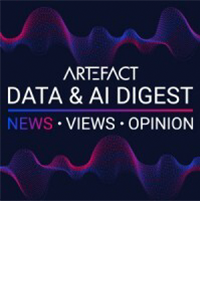In today’s digital age, the antiquated idea of centralised data governance is obsolete. Decentralised Data Governance offers agility, scalability, and empowers local units for rapid decision-making, setting industry leaders apart from followers.
The antiquated notion that centralised data governance is the most efficient way to manage data is no longer tenable. This approach might have suited simpler times, but the digital age demands governance frameworks that are agile, scalable, and responsive. Technologies such as Big Data, machine learning, AI, and blockchain aren’t mere trends; they’re redefining the operational landscape. Their disruptive nature calls for a governance model that is equally transformative. This is where decentralised data governance marks its territory.
Decentralised Data Governance questions the core tenets of how companies perceive and utilise data. Companies reluctant to abandon centralised models are inadvertently staking their futures on increasingly uncertain ground. They risk being sidelined as mere spectators in the rapid transformation of their respective industries. In contrast, those who adopt a decentralised governance model seize the opportunity, positioning themselves as industry leaders rather than followers.
Why does this matter? Decentralised governance empowers local units, allowing them to make swift and informed decisions that cater to their specific needs without getting bogged down by bureaucratic inertia. Organisations succeed or fail based on the speed and efficacy of their decision making.
It’s not merely a question of if an organisation will adapt to the decentralised model but when and how. The transition must be viewed as a fundamental shift, not just a cosmetic change. The willingness to transform data governance reflects an organisation’s readiness to redefine its role within industry.
Decentralised Governance: More than a Buzzword
The concept of decentralised data governance is often mischaracterized as a buzzword or a fad. This couldn’t be further from the truth. Decentralisation is a conceptual and operational pivot from the hierarchical, top-down governance models that have prevailed for decades. Within a decentralised framework, the governance functions are distributed across various ‘nodes’ or centres within the organisation. These could range from different departments to specialised business units or even cross-functional teams.
These nodes are not anarchic entities but operate under a universal governance framework that aligns with broader organisational goals and compliance mandates. This framework provides the rules of engagement for data use, access, and security. This allows the decentralised model to combine the best of both worlds: the agility and localised expertise of distributed governance, along with the strategic alignment and compliance of centralised systems.
The Roadmap to Decentralization: From Strategy to Execution
Having taken the decision to migrate to a decentralised governance model, the next step comes with devising a comprehensive strategy to manage the transition. The process starts with a readiness audit, assessing an organisation’s technical, cultural, and financial preparedness for the change. The audit should involve a diverse set of stakeholders and be structured to provide actionable insights, rather than just descriptive statistics.
Upon establishing this baseline, the organisation needs to craft a robust roadmap that outlines every aspect of the migration, from technical specifications and necessary tooling to human capital requirements and necessary cultural adaptations. More importantly, it must incorporate contingencies for anticipated challenges and unforeseen roadblocks. This roadmap acts as the tactical manual for the transition, steering the project through its entire lifecycle.
The Future of Data Governance: A Call to Action
The adoption of decentralised data governance is not just another trend on the corporate horizon; it’s a seismic shift that will delineate the boundaries between industry leaders and laggards. Organisations failing to recognize its transformative potential will inevitably find themselves fighting for relevance in an increasingly competitive marketplace. On the other hand, early adopters will not only reap the operational and financial benefits but also secure a vanguard position, driving innovation and setting industry standards.
But why should organisations make such a pivotal change? The answer is straightforward: the technological landscape is evolving too quickly for legacy governance models to keep up. The acceleration of technological advancements—ranging from the ubiquitous penetration of AI and machine learning to the advent of the Internet of Things (IoT)—requires a governance model that can adapt and evolve in real-time.
Decentralised governance offers a responsive, adaptive model that can evolve with technological advancements. It accommodates a diverse range of data types, from structured databases to unstructured big data, ensuring that organisations can capitalise on the wealth of data at their disposal. Its modular design makes it exceptionally scalable, allowing for easy integration of new data sources and technologies.
However, the benefits are not solely technological. Decentralised data governance also fosters a transformative cultural shift within organisations. By empowering individual units and employees to assume governance responsibilities, organisations encourage a sense of ownership and engagement that is often absent in more hierarchical setups. This cultural shift is essential for the long-term sustainability of any governance model and can significantly boost employee morale and productivity.
How Can I Get Started Today:
Conduct a Readiness Audit:
Employ a 360-degree approach to assess your readiness. A multidisciplinary team involving IT, legal, compliance, and business unit leaders should conduct the audit. The findings should inform not just the ‘what’ and ‘how’ of the migration, but also the ‘when.’
Define the Business Case:
Total buy-in from the organisation is required to enable a successful transformation, a business-unit led case is required to quantify and articulate the tangible bottom-line benefits to organisational executives to guarantee buy-in.
Define Universal Governance Principles:
Your principles should be exhaustive yet flexible, capturing the ethical and procedural imperatives while allowing room for contextual adjustments. These principles should be communicated across the organisation to ensure complete buy-in.
Create Node-specific KPIs:
While the universal governance principles provide an overarching framework, each decentralised node should have its own set of KPIs. These should align with the broader corporate strategy while providing enough granularity to measure local effectiveness.
Invest in Decentralised Governance Platforms:
Don’t just adapt existing systems; invest in platforms explicitly designed for decentralised governance. This will facilitate a smoother transition and offer more robust functionalities tailored for the new governance model.
Establish Conflict Resolution Mechanisms:
As your organisation decentralises, it’s crucial to have effective mechanisms to resolve conflicts. These mechanisms should be transparent, quick, and fair to maintain organisational coherence and trust.
Strategic Partnerships:
The adoption of decentralised data governance is a monumental task that requires both organisational resolve and specialised expertise. The complexity of this shift necessitates strategic partnerships with firms that not only understand the nuances of decentralised data governance but have the technical acumen to implement it successfully. These partnerships can offer an array of benefits, from providing specialised governance software to offering consultancy services that can help tailor the governance model to your organisation’s unique needs. Moreover, such partnerships offer a safeguard against potential pitfalls, ensuring that the transition is not just smooth but also aligns with best practices and compliance requirements.
Conclusion: The Inevitable Revolution
As we navigate the labyrinth of digital transformation, it’s easy to overlook the significance of underlying structures like data governance. Yet, these are the very frameworks that either limit or liberate our capacity to innovate, adapt, and lead. The shift from centralised to decentralised data governance is not a speculative venture into an unproven domain; it’s an inevitable transition in a digital landscape that no longer accommodates rigid, hierarchical models.
We are at an inflection point where organisations have two paths ahead: one of proactive disruption and another of reactive adaptation. The latter may offer the comfort of familiarity, but it’s a path laden with the risks of obsolescence and decline. Conversely, the former path is a challenging journey but one that offers unparalleled opportunities for innovation, leadership, and sustainable growth.
This isn’t a matter of mere preference; it’s a strategic imperative. The world is fast moving towards a decentralised paradigm, not just in data governance but also in various other spheres like finance (Decentralised Finance or DeFi) and network architecture (Decentralised Web). Those who take the initiative now will set the pace for this transformation, defining the rules of the new game.
In a world that’s moving fast, clinging to old paradigms is the surest way to fall behind. Decentralised data governance is not just an option; it’s the future. But remember, the road to decentralisation is a journey, not a sprint. It requires concerted effort, strategic planning, and, above all, a willingness to break free from the shackles of tradition.
As we come to the close of this comprehensive discourse, we reiterate that the move toward decentralised data governance is both a challenge and an opportunity. For those brave enough to take the leap, the rewards are manifold. You have the power to not only transform your organisation but also to shape the future landscape of data governance. So, where will you stand—in the vanguard of change or on the sidelines of obsolescence?

 BLOG
BLOG






